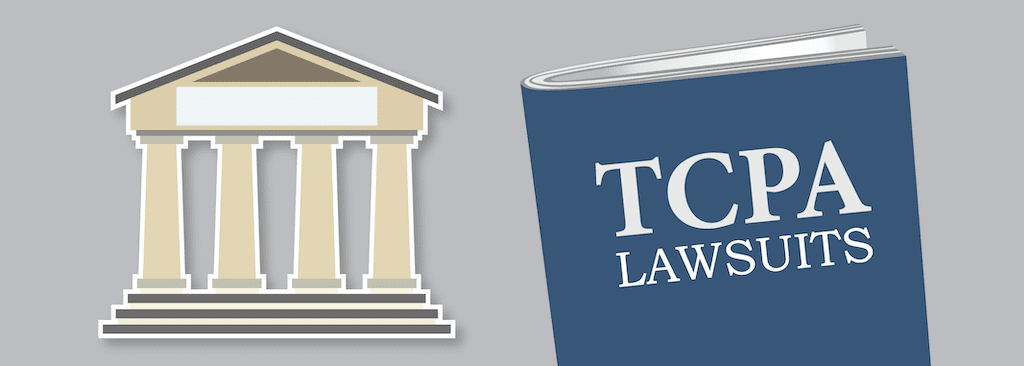The Top 3 Call Center Compliance Lawsuits to Follow in 2019
Lawsuits don’t just affect those involved…
They can have ripple effects on businesses in the entire industry.
Like LaCroix being accused of false marketing for claiming their water is “natural” when it may contain ingredients that are used in insecticides. This can call into question the use of the word “natural” on other beverages from other makers.
Cases involving regulations like TCPA and PCI compliance can have the same far-reaching impact on call centers around the country – not to mention the fact that TCPA penalties are … expensive, to say the least.
So with that in mind, let’s take a look at the top 3 call center compliance lawsuits to follow in 2019.
Lexington Insurance Co. and Beazley Insurance Co. vs Trustwave Holdings Inc.
While this one doesn’t involve call centers, the regulation that was violated certainly does.
Here’s the backstory:
Back in 2008, Heartland Payment Systems endured a massive data breach. According to reports:
“Heartland’s hack exposed some 130 million U.S. debit and credit card accounts – the largest breach ever recorded at the time. The incident, which was first made public in January 2009, led the company to up its security game with end-to-end encryption, tokenization, and EMV chip-and-pin payment card technology.”
The attack also led to Lexington Insurance and Beazley Insurance paying $30 million in claims to their customers.
The two insurers were certified as PCI-DSS compliant by security firm Trustwave Holdings Inc.
But the insurance companies believe Trustwave Holdings didn’t adequately secure their systems, so they filed a lawsuit demanding $30 million in restitution from Trustwave.
First, the insurers sent a letter demanding payment.
After, Trustwave decided to initiate a lawsuit against them in order to quash the issue altogether, saying:
“The insurers’ spurious demand related to a decade-old breach is entirely without merit. Trustwave initiated this lawsuit in order to obtain a judgment accordingly and intends to pursue this matter vigorously.”
Soon after, Lexington and Beazley filed a “duplicative suit” in Illinois against Trustwave.
And the entire case boils down to this:
Trustwave claiming that their PCI-DSS assessment of Heartland Payment Systems wasn’t a guarantee that the company hadn’t already been breached or would be.
Trustwave said:
“Trustwave did not manage Heartland’s information security, and at no time did Heartland assign blame or make any claim against Trustwave.”
This case could have major repercussions.
For one, it means call centers must make sure they’re payment systems are protected and that they’re securely storing customer data in the event a hack or data breach occurs.
But if Trustwave loses the case, it could mean security companies may be more liable in the future for cyber attacks.
DirectTV Robocalls
“On Friday March 29, 2019, U.S. District Judge Dolly M. Gee of the Central District of California certified two proposed plaintiff classes in a federal lawsuit against DIRECTV over allegations the company violated the Telephone Consumer Protection Act (“TCPA”) by directing debt collection companies to make unwanted telemarketing phone calls to consumers on their behalf.”
The details of the case are pretty straight forward:
- Between 2009 and 2014, DirecTV hired 20 different debt collection companies to make calls to over 7 million customers.
- The plaintiff in the case says she received automated calls from these debt collectors even though she had never been a DirecTV customer.
- The suit claims the money was lost due to wasted cell minutes and continued inconvenience.
Call centers and the companies that hire them have to make sure that they’re calling the people they’re supposed to be calling, otherwise, they could land in hot water like DirecTV.
DC Circuit Court Decision on TCPA
The case of ACA International v. FCC may have been finally settled but it’s still a case to watch in 2019 because out of the other two we discussed, this one has the largest impact on the call center industry.
On the Ides of March (March 15), a panel of the D.C. Circuit struck down central elements of the FCC’s 2015 TCPA Omnibus Declaratory Ruling and Order.
Here are the key takeaways according to the Class Defense Blog:
- The court rules that the FCC’s broad definition of an automatic telephone dialing system (ATDS) to include all smartphones is arbitrary and capricious, and required the FCC to reconsider its definition.
- The court also overturned the FCC’s conclusion that callers were subject to liability for any calls placed or text messages sent to phone numbers that had been reassigned after a “safe harbor” of one errant call or text.
- The panel sustained the FCC’s rule authorizing consumers to retract their consent to receive autodialed calls or text messages through “any reasonable means.”
This ruling will probably tempt previous defendants to re-litigate court decisions that weren’t ruled in their favor due to the FCC’s 2015 Omnibus.
This is one of the most important call center compliance lawsuits on our list.
Which brings us to the final question:
How Can Managers Prepare for Call Center Compliance?
It’s certainly not easy for managers to remain TCPA compliant.
What they need is a simple manual they can reference to make sure they’re implementing best practices to effectively navigate recent regulatory changes (like the ones we just covered), and ensure they’re not open to possible breaches.
Which is exactly what we cover in The Manager’s Guide to Call Center Regulations. Click on the link and get a free copy today!
